B M Sharma Solutions for Chapter: Coulomb's Laws and Electric Field, Exercise 4: DPP
B M Sharma Physics Solutions for Exercise - B M Sharma Solutions for Chapter: Coulomb's Laws and Electric Field, Exercise 4: DPP
Attempt the free practice questions on Chapter 1: Coulomb's Laws and Electric Field, Exercise 4: DPP with hints and solutions to strengthen your understanding. Chapterwise/Topicwise Daily Practice Problems (DPP) Electrostatics and Current Electricity JEE Main & Advanced solutions are prepared by Experienced Embibe Experts.
Questions from B M Sharma Solutions for Chapter: Coulomb's Laws and Electric Field, Exercise 4: DPP with Hints & Solutions
Five point charges each having magnitude are placed at the corner of hexagon, as shown in the figure. Net electric field at the centre is . To get the net electric field at as the charge placed on the remaining sixth corner should be
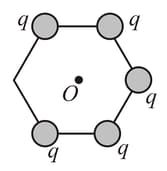
The following figures show regular hexagons, with charges at the vertices. In which of the following cases the electric field at the center is not zero?
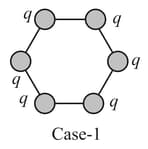
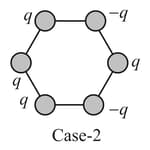
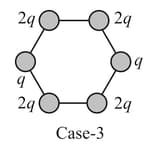
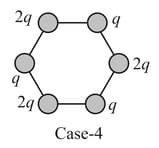
Charges and are placed at the corners and of a square as shown in the following figure. The direction of the electric field at the center of the square is along
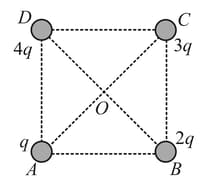
Infinite charges of magnitude each are lying at on the axis. The value of intensity of electric field at point due to these charges will be
Two semicircular rings lying in the same plane of uniform linear charge density , have radii and They are joined using two straight uniformly charged wires of linear charge density and length as shown in the figure. The magnitude of the electric field at the common centre of semicircular rings is
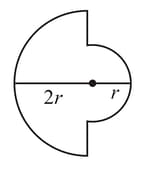
Two concentric rings, one of radius and total charge and the second of radius and total charge lie in the plane (plane). The common center of rings lies at origin and the common axis coincides with the axis. The charge is uniformly distributed on both rings. At what distance from the origin is the net electric field on the -axis zero?
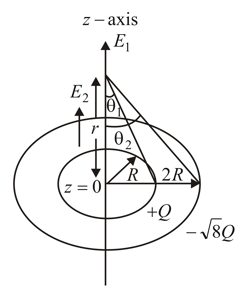
An infinitely long wire is kept along -axis from to having uniform linear charge density The electric field at the point will be
Two point charges and are placed at some separation on positive -axis at points and . It is given that and . If the null point is the point where the net electric field due to both the charges is zero, then
